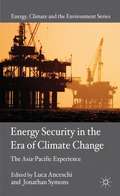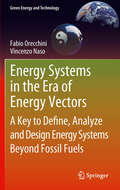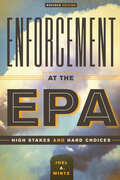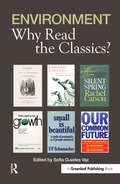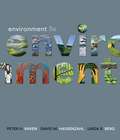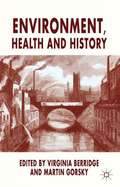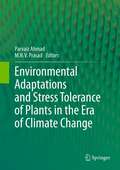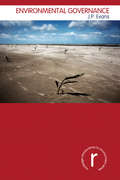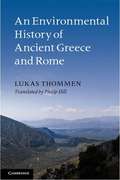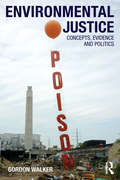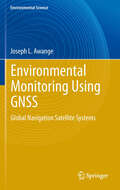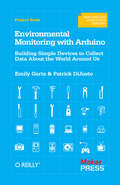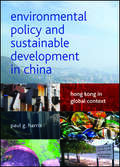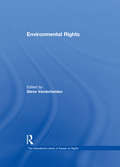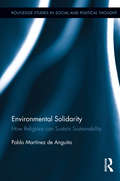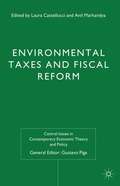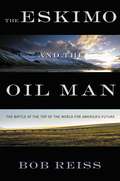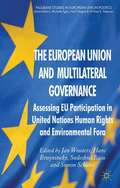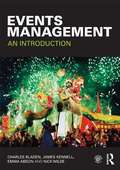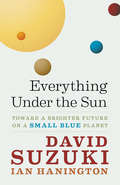- Table View
- List View
Energy Security in the Era of Climate Change
by Luca Anceschi Jonathan SymonsLeading scholars assess the transformations in energy security policy that flow from recognition of global climate change. They explore through case studies the key policy responses formulated in the Asia-Pacific and identify potential synergies between energy policy and climate mitigation efforts.
Energy Systems in the Era of Energy Vectors
by Vincenzo Naso Fabio OrecchiniWhat lies beyond the era of fossil fuels? While most answers focus on different primary energy resources, Energy Systems in the Era of Energy Vectors provides a completely new approach. Instead of providing a traditional consumption analysis of classical primary energy resources such as oil, coal, nuclear power and gas, Energy Systems in the Era of Energy Vectors describes and assesses energy technologies, markets and future strategies, focusing on their capacity to produce, exchange, and use energy vectors. Special attention is given to the renewable energy resources available in different areas of the world and made exploitable by the integration of energy vectors in the global energy system. Clear definitions of energy vectors and energy systems are used as the basis for a complete explanation and assessment of up-to-date, available technologies for energy resources, transport and storage systems, conversion and use. The energy vectors scheme allows the potential realization of a worldwide sustainable energy system to fulfill global development expectations by minimizing both the impact on the environment, and the international political frictions for access to limited and concentrated resources. Energy Systems in the Era of Energy Vectors is an informative read for researchers and advanced students in industrial, energy and environmental engineering. It also contains valuable information for managers and technicians working in the energy sector.
Enforcement at the EPA: High Stakes and Hard Choices, Revised Edition
by Joel A. MintzThe only published work that treats the historical evolution of EPA enforcement, this book provides a candid inside glimpse of a crucial aspect of the work of an important federal agency. Based on 190 personal interviews with present and former enforcement officials at EPA, the U.S. Department of Justice, and key congressional staff members—along with extensive research among EPA documents and secondary sources—the book vividly recounts the often tumultuous history of EPA’s enforcement program. It also analyzes some important questions regarding EPA’s institutional relationships and the Agency’s working environment. This revised and updated edition adds substantial new chapters examining EPA enforcement during the Clinton and George W. Bush administrations. Its treatment of issues of civil service decline and the applicability of captive agency theory is also new and original.
Enforcement at the EPA: High Stakes and Hard Choices
by Joel A. MintzThe only published work that treats the historical evolution of EPA enforcement, this book provides a candid inside glimpse of a crucial aspect of the work of an important federal agency. Based on 190 personal interviews with present and former enforcement officials at EPA, the U. S. Department of Justice, and key congressional staff members-along with extensive research among EPA documents and secondary sources-the book vividly recounts the often tumultuous history of EPA's enforcement program. It also analyzes some important questions regarding EPA's institutional relationships and the Agency's working environment. This revised and updated edition adds substantial new chapters examining EPA enforcement during the Clinton and George W. Bush administrations. Its treatment of issues of civil service decline and the applicability of captive agency theory is also new and original.
Environment: Why Read The Classics?
by Sofia Guedes VazEnvironment: Why Read the Classics? presents six important essays by some of the world's leading environmental thinkers on six of the most emblematic books ever written on the environment. The books – Walden; A Sand County Almanac; Small is Beautiful; Silent Spring; The Limits to Growth; and Our Common Future – taken together have been hugely important in the development of global environmental awareness, activism and policy. The essayists – Viriato Soromenho-Marques, J. Baird Callicott, José Lima Santos, Tim O'Riordan, Satish Kumar and Marina Silva – invite readers to reflect on these ground-breaking works and examine their historical importance, as well as what they should mean to us today and what relevance they will have to future generations. More than just books about the environment, these are also philosophical treatises, in that they increase our understanding of the natural world and of ourselves, calling us "to weigh and consider", as Bacon put it. In particular, they make us reflect on the need to constantly redefine the purposes of progress, the economy and society. How we relate to nature is a crucial aspect in the plans we make as a species, and as individuals; and every one of these books inspires a more respectful relationship, both with nature and humanity, and consequently with ourselves. The six essays in this book are the result of a series of conferences organised in Lisbon by the Calouste Gulbenkian Foundation with the support of the American Embassy in Portugal. Its *raison d'être* was to revisit the ideas that have shaped the environmental movement, seeking inspiration to deal with what looks like a very challenging future. The significance of such timeless concepts is now more apparent than ever; and these evergreen books are full of ideas that retain their spark even in our difficult times. This is what makes them classics. Environment: Why Read the Classics? is a provocative book and will be essential reading for all those concerned about the state of the world.
Environment (Eighth Edition)
by Peter H. Raven Linda R. Berg David M. HassenzahlThe 8th Edition of "Environment" builds on the previous comprehensive, systems-based environmental science issue with more in-depth information on systems approach, which emphasizes the interconnected nature of environmental science throughout the text. The book is even more reader-friendly integrated learning system designed to help move from general concepts to specific applications and continues to focus on currency. It presents the basic facts, various perspectives on issues, and framework to help readers reach their own informed decisions in a changing marketplace.
Environment, Health and History
by Virginia Berridge Martin GorskyThe environment is currently a matter of international public and academic concern, but is often considered separately from health issues. This book brings together work from environmental and health historians to conceptualise the connection between environment and health at different times and in different geographical locations.
Environmental Adaptations and Stress Tolerance of Plants in the Era of Climate Change
by M.N.V. Prasad Parvaiz AhmadClimate change is a complex phenomenon with a wide range of impacts on the environment. Biotic and abiotic stress are a result of climate change. Abiotic stress is caused by primary and secondary stresses which are an impediment to plant productivity. Prolonged exposure to these stresses results in altered metabolism and damage to biomolecules. Plants evolve defense mechanisms to withstand these stresses, e.g. synthesis of osmolytes, osmoprotectants, and antioxidants. Stress responsive genes and gene products including expressed proteins are implicated in conferring tolerance to the plant. This volume will provide the reader with a wide spectrum of information, including vital references. It also provides information as to how phytoconstituents, hormones and plant associated microbes help the plants to tolerate the stress. This volume also highlights the use of plant resources for ameliorating soil contaminants such as heavy metals. Dr. Parvaiz is Assistant professor in Botany at A.S. College, Srinagar, Jammu and Kashmir, India. He has completed his post-graduation in Botany in 2000 from Jamia Hamdard New Delhi India. After his Ph.D from the Indian Institute of Technology (IIT) Delhi, India in 2007 he joined the International Centre for Genetic Engineering and Biotechnology, New Delhi. He has published more than 20 research papers in peer reviewed journals and 4 book chapters. He has also edited a volume which is in press with Studium Press Pvt. India Ltd., New Delhi, India. Dr. Parvaiz is actively engaged in studying the molecular and physio-biochemical responses of different plants (mulberry, pea, Indian mustard) under environmental stress. Prof. M.N.V. Prasad is a Professor in the Department of Plant Sciences at the University of Hyderabad, India. He received B.Sc. (1973) and M.Sc. (1975) degrees from Andhra University, India, and the Ph.D. degree (1979) in botany from the University of Lucknow, India. Prasad had published 216 articles in peer reviewed journals and 82 book chapters and conference proceedings in the broad area of environmental botany and heavy metal stress in plants. He is the author, co-author, editor, or co-editor for eight books. He is the recipient of Pitamber Pant national Environment Fellowship of 2007 awarded by the Ministry of Environment and Forests, Government of India.
Environmental Flows
by Angela H. ArthingtonEnvironmental Flows describes the timing, quality, and quantity of water flows required to sustain freshwater and estuarine ecosystems and the human well-being and livelihoods that depend upon them. It answers crucial questions about the flow of water within and between different kinds of ecosystems. What happens when the flow or the availability of water is curtailed or diverted, either naturally or by human activity? How will climate change alter the availability of water and impact aquatic ecosystems? Methodological developments from the simplest hydrological formulas to large-scale frameworks that inform water management make this book a must-read for water managers and freshwater and estuarine ecologists contending with ever-changing conditions influencing the flow of water.hington ends with an appeal to address the freshwater biodiversity crisis, and turn the third millennium into an era of transformation and restoration of Earth's natural resiliency and healing power for the benefit of ecosystems and people.
Environmental Governance (Routledge Introductions to Environment: Environment and Society Texts)
by J. P. EvansClimate change is prompting an unprecedented questioning of the fundamental bases upon which society is founded. Businesses claim that technology can save the environment, while politicians champion the role of international environmental agreements to secure global action. Economists suggest that we should pay developing countries not to destroy their forests, while environmentalists question whether we can solve ecological problems with the same thinking that created them. As the process of steering society, governance has a critical role to play in coordinating these disparate voices and securing collective action to achieve a more sustainable future. Environmental Governance is the only book to discuss the first principles of governance, while also providing a critical overview of the wide ranging theories and approaches that underpin policy and practice today. It places governance within its wider political context to explore how the environment is controlled, manipulated, regulated, and contested by a range of actors and institutions. This book shows how network and market governance have shaped current approaches to environmental issues, while also introducing emerging approaches such as transition management and adaptive governance. In so doing, it highlights the strengths and weaknesses of the different approaches currently in play, and considers their political implications. This text provides a groundbreaking overview of dominant and emerging approaches of environmental governance, drawing on cutting edge debates and forging critical links between them. Each chapter is complemented by case studies, key debates, questions for discussion and further reading. It is essential reading for students of the environment, politics and sociology, and, indeed, anyone concerned with changing society to secure a more sustainable future.
An Environmental History of Ancient Greece and Rome
by Lukas Thommen Philip HillIn ancient Greece and Rome an ambiguous relationship developed between man and nature, and this decisively determined the manner in which they treated the environment. On the one hand, nature was conceived as a space characterized and inhabited by divine powers, which deserved appropriate respect. On the other, a rationalist view emerged, according to which humans were to subdue nature using their technologies and to dispose of its resources. This book systematically describes the ways in which the Greeks and Romans intervened in the environment and thus traces the history of the tension between the exploitation of resources and the protection of nature, from early Greece to the period of late antiquity. At the same time it analyses the comprehensive opening up of the Mediterranean and the northern frontier regions, both for settlement and for economic activity. The book's level and approach make it highly accessible to students and non-specialists.
Environmental Justice: Concepts, Evidence and Politics (Antipode Book Ser. #26)
by Gordon WalkerEnvironmental justice has increasingly become part of the language of environmental activism, political debate, academic research and policy making around the world. It raises questions about how the environment impacts on different people’s lives. Does pollution follow the poor? Are some communities far more vulnerable to the impacts of flooding or climate change than others? Are the benefits of access to green space for all, or only for some? Do powerful voices dominate environmental decisions to the exclusion of others? This book focuses on such questions and the complexities involved in answering them. It explores the diversity of ways in which environment and social difference are intertwined and how the justice of their interrelationship matters. It has a distinctive international perspective, tracing how the discourse of environmental justice has moved around the world and across scales to include global concerns, and examining research, activism and policy development in the US, the UK, South Africa and other countries. The widening scope and diversity of what has been positioned within an environmental justice ‘frame’ is also reflected in chapters that focus on waste, air quality, flooding, urban greenspace and climate change. In each case, the basis for evidence of inequalities in impacts, vulnerabilities and responsibilities is examined, asking questions about the knowledge that is produced, the assumptions involved and the concepts of justice that are being deployed in both academic and political contexts. Environmental Justice offers a wide ranging analysis of this rapidly evolving field, with compelling examples of the processes involved in producing inequalities and the challenges faced in advancing the interests of the disadvantaged. It provides a critical framework for understanding environmental justice in various spatial and political contexts, and will be of interest to those studying Environmental Studies, Geography, Politics and Sociology.
Environmental Monitoring using GNSS
by Joseph L. AwangeGlobal Navigation Satellite Systems (GNSS) are revolutionizing the world in a way their original developers never envisaged. From being military "war" tools, GNSS satellites are rapidly becoming "peace" tools that play a potentially critical role in enabling changing environmental phenomenon that do not permit direct measurements to be remotely observed via their all-weather, highly accurate and continuously updatable positional time series. This is evident, for example, in their use in emerging environmental monitoring methods that are considered in this book. These include: GPS-based radio telemetry, which is enhancing ecological and conservation monitoring by more accurately mapping animal movements, their behaviours, and their impact on the environment; GNSS-meteorology, which is contributing to weather and climate change studies; GNSS-remote sensing, which, for example, allows the rapid monitoring of changes in fresh water resources and cryosphere; Geosensor network techniques, which are earning a crucial role in disaster response management; Epidemiology, for improved efficiency in tracking and studying the spread of infectious diseases and climate change effects on vector-borne diseases; and Economics, to provide data for the econometric modelling of casual impact of policies. In Environmental Impact Assessments (EIA), Strategic Environmental Assessments (SEA), and Sustainability Assessments (SA), GNSS, together with other spaced-based remote sensing techniques, are emerging, not only as modern tools that connect the developers to the community, but also provide information that support Multi-Criteria Analysis (MCA) methods, which inform decision making and policy formulations. By bringing the two fields of geodesy (the parent of GNSS technology) and environmental studies (potential users of this technology), this book presents the concepts of GNSS in a simplified way that can, on the one hand, be understood and utilised by environmentalists, while on the other, outlines its potential applications to environmental monitoring and management for those engaged more with its technology, which hopefully will further energise the already innovative research that is being carried out. Lastly, this book is most relevant to all the professionals whose work is related to the environment such as hydrologists, meteorologists, epidemiologists, economist, and engineers, to name just a few.A comprehensive yet candid and compelling presentation of Global Navigation Satellite Systems and its application to environmental monitoring and a host of other socio-economic activities. This is an essential and new ground breaking reading for all professional practitioners and even academics seeking to study and become involved in using Global Navigation Satellite Systems in diverse fields ranging from environmental monitoring to economic activities such as monitoring weather and climate in order to design crop failure insurance. Nathaniel O. Agola, Professor of Business and Financial Economics, Ritsumeikan University, Japan
Environmental Monitoring with Arduino
by Emily Gertz Patrick Di Justo<p>Right now, thousands of people worldwide are tracking environmental conditions with monitoring devices they’ve built themselves. You can do it too! This inspiring guide shows you how to use Arduino to create gadgets for measuring noise, weather, electromagnetic interference (EMI), water purity, and more. You’ll also learn how to collect and share your own data, and you can experiment by creating your own variations of the gadgets covered in the book. If you’re new to DIY electronics, the first chapter offers a primer on electronic circuits and Arduino programming.</p>
Environmental policy and sustainable development in China: Hong Kong in Global Context
by Paul G. HarrisDrawing on practices and theories of sustainability, Environmental policy and sustainable development in China explores the prospects for achieving environmentally benign economic and social development in China and beyond. Using the Chinese 'world city' of Hong Kong as a backdrop and case study, it introduces major conceptions of sustainability, describes historical and political contexts for environmental policymaking, and analyses key challenges related to sustainable development, including air pollution, water quality, waste, transport and climate change. The book will be a valuable and unique resource for students, teachers and readers interested in environmental policy, sustainable development and ecological governance, especially in China and Hong Kong. All of the author's royalties from sales of this book will be donated by Policy Press to Friends of the Earth (Hong Kong) and WWF (Hong Kong).
Environmental Rights (The\international Library Of Essays On Rights Ser.)
by Steve VanderheidenThe essays selected for this volume present critical viewpoints from the debate about the need to establish rights on behalf of greater environmental protection. Three main areas for developing environmental rights are surveyed, including: extensionist theories that link existing rights (for example to subsistence or territory) to threats of harm from exacerbated resource scarcity, pollution or rapid environmental change; proposals for rights to specified environmental goods or services, such as rights to a safe environment and the capacity to assimilate greenhouse gas emissions; and rights that protect the interests of parties not currently recognized as having rights, including nonhuman subjects, natural objects and future generations. This volume captures the potential for and primary challenges to the development of rights as instruments for safeguarding the planet's life-support capacities and features proposals and analyses which argue the need to create an avenue of recourse against ecological degradation, whether on behalf of human or nonhuman right holders.
Environmental Solidarity: How Religions Can Sustain Sustainability (Routledge Studies in Social and Political Thought)
by Pablo Martínez de AnguitaThe past few decades have seen the beginnings of a convergence between religions and ecological movements. The environmental crisis has called the religions of the world to respond by finding their voice within the larger Earth community. At the same time, a certain religiosity has started to emerge in some areas of secular ecological thinking. Beyond mere religious utilitarianism, rooted in an understanding of the deepest connections between human beings, their worldviews, and nature itself, this book tries to show how religious believers can look at the world through the eyes of faith and find a broader paradigm to sustain sustainability, proposing a model for transposing this paradigm into practice, so as to develop long-term sustainable solutions that can be tested against reality.
Environmental Taxes and Fiscal Reform (Central Issues in Contemporary Economic Theory and Policy)
by Laura Castellucci Anil MarkandyaA review of the literature on environmental taxes, focusing on European experiences, and analysing how such taxes can contribute to green causes as well as reducing the tax burden from "ordinary" taxation. The authors examine the potential 'double dividend' from tax reform for helping the environment, reducing unemployment and encouraging growth.
The Eskimo and the Oil Man: The Battle at the Top of the World for America's Future
by Bob ReissThe Arctic century is upon us. A great jockeying for power and influence has erupted among nations in the high north. At stake are trillions of dollars in profit or loss, US security, geopolitical influence and the fate of a fragile environment as well as the region's traditional people. As the ice melts and oil companies venture north, the polar regions may become the next Panama Canal, the next Arabian Peninsula-places on earth that remain relatively unknown in one century and become pivotal in the next. Now Shell oil plans to sink exploratory wells in the pristine waters off the North Slope of Alaska-a site that the company believes contains three times as much oil as the Gulf of Mexico.THE ESKIMO AND THE OIL MAN tells this story through the eyes of two men, one an Iñupiat Eskimo leader on Alaska's North Slope, the other the head of Shell Oil's Alaska venture. Their saga is set against the background of an undersea land rush in the Arctic, with Russian bombers appearing off Alaska's coast, and rapid changes in ice that put millions of sea mammals at risk. The men's decisions will affect the daily lives of all Americans, in their cities and towns and also in their pocketbooks. The story begins as a fight and ends with a surprise.In the spirit of Thomas L. Friedman's Hot, Flat, and Crowded, bestselling author Bob Reiss traveled in America's High North over three years and spent time with scientists, diplomats, military planners, Eskimo whale hunters and officials at the highest levels of the government. He traveled to remote villages and sailed on a US icebreaker. THE ESKIMO AND THE OIL MAN reflects the issues dividing every American community wrestling with the balance between energy use and environmental protection, our love of cheap gas and the romance of pristine wilderness.
The European Union and Multilateral Governance
by Jan Wouters Hans Bruyninckx Sudeshna Basu Simon SchunzAn interdisciplinary approach to the study of the EU in UN human rights and environmental governance which addresses the legal and political science dimensions. With contributions from academics and policy-makers, this volume is a comprehensive analysis of how the challenges it faces impact on the EU's position in UN fora.
Events Management
by Charles Bladen James Kennell Nick Wilde Emma AbsonContemporary events management is a diverse and challenging field. This major new introductory textbook is the first to fully explore the multi-disciplinary nature of events management and to provide all the practical skills and professional knowledge students need to succeed in the events industry. The book covers every type of event studied on an Events Management course, including sports, music, the arts, corporate events, tourism, and the public and voluntary sectors. It introduces the key issues facing the contemporary events industry, from health, safety and risk management to sustainability to developing a market-oriented business, with every topic brought to life through case-studies, personal biographies and examples of best practice. Written by a team of authors with many years of industry experience, it introduces the practical skills required in every core area of events management, including marketing, finance, project management, strategy, operations, event design and human resources. A companion website for the book includes a dazzling array of additional features, including self-test questions, audio interviews with key industry figures, additional case-studies and PowerPoint slides for each chapter. Events Management: An Introduction is the essential course text for any events management program.
Everest 1953: The Epic Story of the First Ascent
by Mick ConefreyOn the morning of 2 June 1953, the day of Queen Elizabeth's coronation, the first news broke that Everest had finally been conquered. Drawing on first-hand interviews and unprecedented access to archives, this is a ground-breaking new account of that extraordinary first ascent. Revealing that what has gone down in history as a supremely well-planned expedition was actually beset by crisis and controversy, Everest 1953 recounts a bygone age of self-sacrifice and heroism, using letters and personal diaries to reveal the immense stress and heartache the climbers often hid from their fellow team members. Charting how the ascent affected the original team in subsequent years and detailing its immense cultural impact today, Everest 1953 is the perfect book to commemorate this remarkable feat of the human will.
Everglades Patrol
by Tom ShirleyAs law enforcement officer and game manager for the Florida Game and Fresh Water Fish Commission, Lt. Tom Shirley was the law in one of the last true frontiers in the nation--the Florida Everglades.In Everglades Patrol, Shirley shares the stories from his beat--an ecosystem larger than the state of Rhode Island. His vivid narrative includes dangerous tales of hunting down rogue gladesmen and gators and airboat chases through the wetlands in search of illegal hunters and moonshiners.During his thirty-year career (1955-1985), Shirley saw the Glades go from frontier wilderness to "ruination" at the hands of the Army Corps of Engineers. He watched as dikes cut off the water flow and controlled floods submerged islands that had supported man and animals for 3,000 years, killing much of the wildlife he was sworn to protect.
Everybody Matters: A Memoir
by Mary RobinsonShortlisted for the Political Book Awards 2013 Political Book of the YearThe first woman President of Ireland, who became UN High Commissioner for Human Rights, Mary Robinson has spent her life in pursuit of a fairer world.Now, for the first time, she reveals what lies behind the vision, strength and determination that has helped her to achieve so much for human rights around the globe.She describes the upbringing which gave her her strong sense of values and how she came into painful conflict with her parents - marrying against their wishes and, later, helping to legalise contraception in a deeply Catholic Ireland.As a barrister she won landmark cases advancing the causes of women and the marginalised against the prejudices of the day. When - to the surprise of many - she became the first woman President of Ireland in 1990, she put Ireland firmly on the international stage.Accepting the position of UN High Commissioner for Human Rights in 1997 was her biggest challenge and here she describes the huge political difficulties she encountered among the many triumphs. Subsequently, based in New York, she led Realizing Rights for eight years, pioneering how to implement in practice economic and social rights: working in African countries on health, decent work, corporate responsibility and women's empowerment in peace and security. Now heading her own Climate Justice foundation she has succeeded in finding the independence she needs to work effectively on behalf of the millions of poor around the world most affected by climate change. Told with the same calm conviction and modest pride that has guided her life, Everybody Matters will inspire everyone who reads it with the belief that each of us can, in our own way, help to change the world for the better.
Everything Under the Sun
by David Suzuki Ian HaningtonIn this compilation of David Suzuki's latest thoughts and writings, the renowned scientist, author, and broadcaster explores the myriad environmental challenges the world faces and their interconnected causes. In doing so, Suzuki shows that understanding the causes-and recognizing that everything in nature, including us, is interconnected-is crucial to restoring hope for a better future. The solutions are there, he argues; we just need the will to act together to bring about change.Everything Under the Sun delves into such provocative topics as the difference between human hunters and other predators, the lessons we must learn from the devastating earthquake and tsunami in Japan and the subsequent meltdown of the nuclear reactors, and our dependence on the sun for all of our food and energy-indeed for our very lives. Suzuki also considers the many positive steps people are making today. And he doesn't shy away from controversial opinion, especially when it comes to taking on those who stand in the way of resolving serious issues like climate change.Underpinning it all is the recognition that we are blessed to live on a planet that gives us everything we require to live, under a sun that gives us the energy we need to produce food and transport and modern conveniences. But we must protect what we have if we want to survive and prosper.
